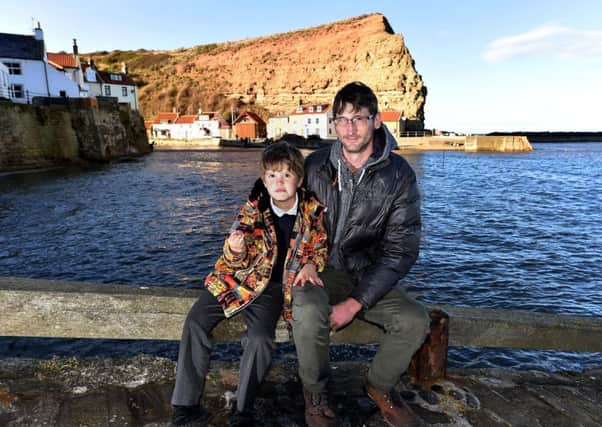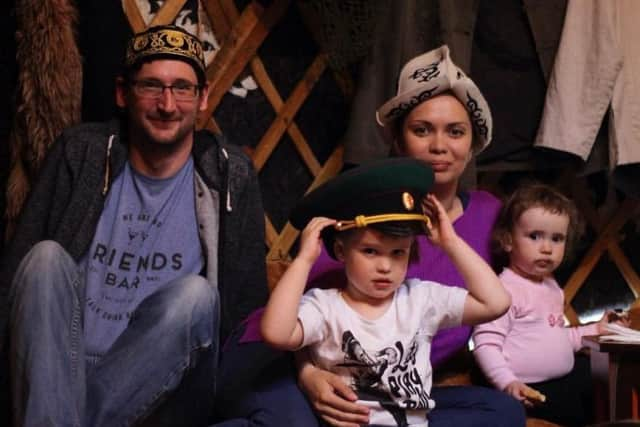Family split between Yorkshire and Russia desperate to reunite but say immigration rules are tearing them apart


It has been a year since Richard Bagshaw last lived with his wife and their youngest child. He and son William, five, call the Yorkshire seaside town of Staithes their home; but it is four thousand miles away from the city of Novosibirsk in Russia where his wife of six years Mariia and their three-year-old daughter Lilly reside.
Despite an attempt for all four of them to live in the UK, the family say they are torn apart by British immigration rules. “I am heartbroken,” says Richard, 41. “It is all I think about everyday. I can’t live normally. I can’t plan my life.”


Advertisement
Hide AdAdvertisement
Hide AdA week-long visit to the Siberian city in April was the last chance young William had to see his mother; and for Lilly it was a rare chance to spend time with her dad. Leaving again was devastating. “My son will not speak to his mother on Skype or on the phone. He wants her here. He doesn’t want to talk to her on a phone or by screen. He is getting really upset, really nervous and anxious.” The stories he hears from Mariia about his little girl are no less distressing. “My daughter needs a father figure around. When she is playing in the playground, she goes and plays with other dads because her dad isn’t there. She wants her dad.”
Richard, who is from St Helen’s, moved to Russia in 2006. There, he met his future wife at an underground jazz bar in 2011 and they married the following year. Last summer, the family decided to move to England, in part to be close to Richard’s pensioner parents. Mariia initially joined her husband and children on a visit, but she returned to Russia with Lilly and in November applied for a family visa so that she could live in the UK. It was rejected in February, says Richard, who claims he cannot get residency in Russia because of a criminal record.
“We were distraught. I was very angry and upset, because I believe that it is my right as a citizen to marry who I want and live with who I want.”
Immigration rules, which came into force in July 2012, mean a ‘minimum income threshold’ applies when non-European Economic Area nationals like Maria, 36, wish to settle in this country with their spouses. The Home Office asks for evidence that the sponsor, in this case Richard, can meet this £18,600 requirement. Richard says he earned above the threshold whilst employed in Russia, through teaching work, but claims he is struggling to prove it as the job was cash-in-hand, and he has no paperwork showing a salary entering his bank account.
Advertisement
Hide AdAdvertisement
Hide AdAs Richard, 41, was returning to the UK from working abroad, his wife’s visa application also required him to have a confirmed offer of employment in this country, starting within three months of his return. He had lined up administrative work, he says, but, living as a single parent, “ had to turn it down” to look after his son.
Childminder fees would not be affordable, he claims, so he is instead working part time - and says he has “no hope” of meeting the financial threshold now. “I’m trying to work as many hours as I can to meet this income requirement but I’m not succeeding.” Though he believes strict rules on immigration are needed, he accuses the Government of “destroying families”. “I should be able to live in this country with the person that I love and my family. British children should be able to live with their mother in their own country no matter what nationality their mother is.”
The Coalition Government’s rationale for introducing the income requirement was that family migrants and their British-based sponsors should have sufficient finances to support themselves and “enable the migrant to participate in society without being a burden on the general taxpayer”, a House of Commons briefing from last November states. “The underlying objective for the broader changes to family visas was to further the Coalition Government’s objective of reducing net migration levels from hundreds of thousands to tens of thousands.” The threshold was set at £18,600 after advice from the Migration Advisory Committee, the briefing adds, which identified the figure as the level of annual gross pay at which a couple would not receive income-related benefits.
In 2015, a paper published the Children’s Commissioner for England said up to 15,000 British children were growing up in ‘Skype families’ because the immigration rules introduced in 2012 did not allow both their parents to live together in the UK. “Many children are reportedly suffering from significant stress and anxiety from the separation of their parents as a result, and relying on Skype to keep in touch with the stranded parents overseas,” the commissioner said. The paper was based on research from Middlesex University and the Joint Council for the Welfare of Immigrants (JCWI).
Advertisement
Hide AdAdvertisement
Hide AdCo-author Dr Helena Wray Associate Professor of Law at said at the time: “Our research shows that the financial requirements are much more onerous than they need to be to protect the public purse and mean that British families cannot live together in the UK even when this is the only practical option. The result has been the separation of parents and children, heartache and misery.”
In 2016, a report by the Migration Observatory at the University of Oxford said close to 40 per cent of employed British citizens had earned less than the minimum income threshold in 2015. Because earnings varied depending on characteristics including age, education, ethnicity and location, “some groups are therefore more likely than others to meet the Government’s definition of a ‘burden on the state’”.
In February last year, the Supreme Court said the minimum income requirement was acceptable in principle and the fact that it “may cause hardship to many does not render it unlawful”. But it ruled that changes were required over the duty to safeguard and promote the welfare of children and over other funding sources available to a couple. Amended rules and guidance came into effect in August 2017.
But Mary Atkinson, a families together project officer for the JCWI, which has been offering advice to Richard, claims thousands of families are still being “ripped apart” because of “cruel rules”. “There can be no justification for a policy like this that splits up families on the basis of their income. Denying grandparents the joy of seeing their grandchildren grow up simply because the family does not earn enough is absolutely senseless - we can and must do better.”
Advertisement
Hide AdAdvertisement
Hide AdThe country’s immigration system remains a hot topic as Britain prepares to leave the European Union. Last week, Home Secretary Sajid Javid promised to review immigration structures and processes “to ensure that they deliver a system in a way that is fair and humane” and are fit for a new immigration system after Brexit.
“The Home Secretary has a chance to deliver a system that works for everyone and that keeps families together where they belong,” says Mary. “He must seize this chance.”
The Home Office said it asks for evidence that people wanting to sponsor a non-EEA spouse meet the threshold “to ensure families can support themselves financially”.
A spokesperson said: “The Supreme Court has endorsed our approach in setting an income requirement for family migration that prevents burdens on the taxpayer and promotes integration.
Advertisement
Hide AdAdvertisement
Hide Ad“The best interests of any children are taken into account, as a primary consideration, in decision making and, in cases involving exceptional circumstances, we assess the further financial support available to a family. All cases are carefully considered on their individual merits, in line with the immigration rules and our policy on exceptional circumstances.”
